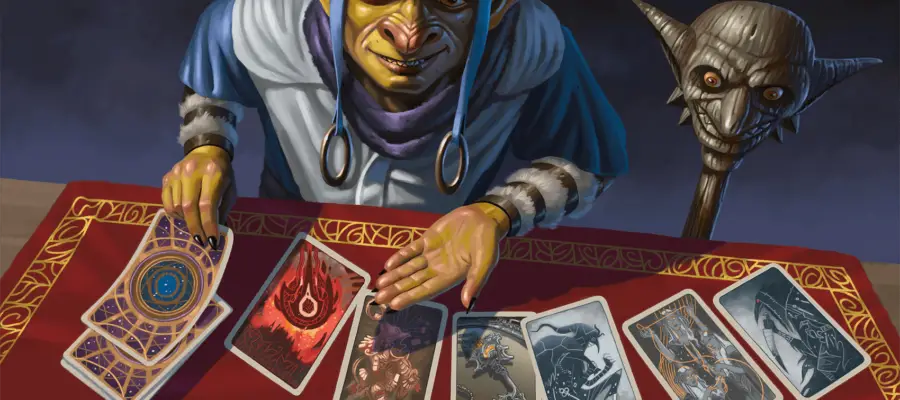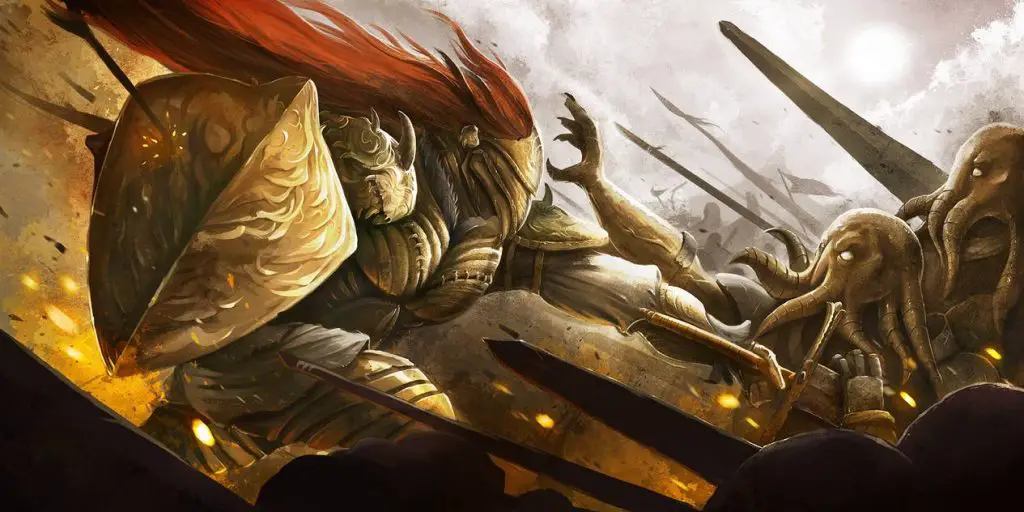Player Agency D&D featured art is from the Book of Many Things. This article contains affiliate links to put gold in our coffers.
Player agency is critical to my enjoyment of a TTRPG. I remember how I felt playing D&D for the first time. It was magic! I felt that each choice I made, from my Dexterity score to the chalk in my inventory, would matter. Fortunately, I had a DM who enabled me to enjoy using every line of my character sheet. However, this new-player energy was short-lived. After playing for several years, I realized my choices frequently didn’t matter. I could turn off my brain during combat. I’d hasten roleplaying encounters and test whether each game’s conclusion was foregone or predetermined, and they were. I became somewhat jaded about my agency as a player, and my instigator playstyle bordered on being disruptive.
Fast-forward to now, and my focus is on DMing. I run games I’d want to play in, where every choice feels significant. I’m finally honing my craft to ensure that the rules and houserules work harmoniously to enhance player agency. I impart my knowledge so you prioritize player agency in your gaming experience. That goes for DMs and players.
Click to Misty Step to your favorite part of this player agency article:
What Is Player Agency in D&D?
What Is Player Agency Good for?
Understanding Player Agency in D&D
Categories of Player Agency in D&D
In-Game Player Agency Examples
Out-of-Game Player Agency Examples
How to Give Players Agency in D&D
Preparing Content Based on Player Choices
Balancing Player Agency and Storytelling
How to Quantify Your Player Agency
What Is Player Agency in D&D?
I define player agency as players experiencing the freedom to make impactful choices tied to a game’s outcomes. It is the magic sauce that assures players their choices matter. It encourages them to invest time and energy into a shared gaming experience.
Player agency is the entire point of playing a TTRPG. Freedom and player agency set TTRPGs apart from video games and board games. TTRPG players possess control (agency) to steer the events and happenings of the game. You can only explore a video game as far as its programming allows. D&D is limited solely by its participants, particularly the extent your DM can roll with your choices. Without player agency, you might as well play a video game. After all, video games calculate and process faster. Writing a book about an epic adventure is another alternative if you don’t want to adapt to player choices.
Have you heard of the Quantum Ogre? It’s a scenario about a foregone conclusion that disregards player choices. Players can fork left or right on the road, but either road leads to the same ogre encounter. No matter what the players do, the DM will guarantee a given encounter will occur. This is a fine concept for recycling preparations for later. However, DMs forcing outcomes behind illusions of choice risk killing their credibility as a game referee when players catch on.
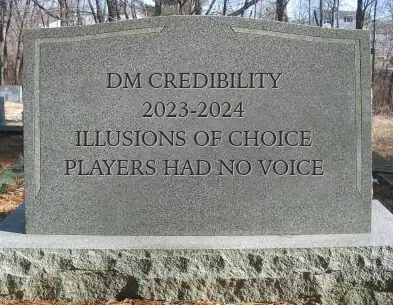
What Is Player Agency Good for?
DMs should care about player agency. Players who feel they have agency will engage more frequently and deeply with the game. It’s a DM’s dream to have players immersed and invested in the game. Player agency is the key to realizing this dream. The best DMs embrace player agency. They create scenarios and worlds where they can delight in seeing events unfold based on players’ choices and interests. This is important because many new DMs these days think they need to be master storytellers. The truth is they need to facilitate and maximize player agency. I’ll explore in this article how they can accomplish that goal.
Specifically, player agency encourages roleplaying and strategizing. Do you want players to take notes and discuss the game when you’re not playing it? They probably will if they’re excited about the choices they have to make. Players become irresistibly engaged and invested in games where their choices matter. The outcomes are evidently and substantially steered by their freedom of choice.
I bet you’ve heard of DM-PCs who steal the spotlight. One key reason DM-PCs annoy players is they rob the ability to steer the campaign. The DM already has enough to control and enjoyment. They should leave the gameplay decisions to the players instead of their NPCs if they want players to return and play for years and years.
Understanding Player Agency in D&D
Player agency is pervasive within a TTRPG like D&D. Every bit of game design is either tied to an existing desire within your players or prompts a new desire. For example, a new player may want to play a mighty hero, thus utilizing the rules to learn how to deal massive damage. That same new player may notice they can play a Dragonborn that speaks Draconic, so they hope to speak with dragons and utilize their language.
Categories of Player Agency in D&D
I will highlight noteworthy aspects of D&D 5e’s game design that affect player expectations and agency. Mastering any of these categories will positively impact your game as they encourage players to feel free to express their agency through meaningful interaction with your game world.
In-Game Player Agency Examples
- Combat: The best DMs don’t invalidate player choices by making combat a foregone conclusion where the monsters’ hitpoints aren’t tracked, and the damage rolls don’t matter like they’re playing Whose Line Is It Anyway? One reason terrain is a fantastic way to spice up combat is it prompts players to think about how it affects their decisions. If combat feels boring, consider if player agency has been adequately engaged.
- Outcomes (Good or Bad): Allow consequences and benefits to unfold based on what the characters choose to do. If you don’t, players may become murder hobos. Players will frequently discuss the campaign between sessions if they’re intrigued by the villain’s plot or if there is an NPC they’re not sure they should recruit as an ally. They want to discuss options with the group because they want to make things happen in the game, and they eagerly await the outcomes.
- Quests and Goals: Sometimes your players want you to lead them on the questing railroad so they don’t have to think. Sure, it happens. However, I recommend letting players navigate the goals and quests they pursue. It’s better to give them many options of what to do and let them choose than to give them one option they don’t care for. Remember to give them enough time to do what they want without sacrificing the ability to save the world due to the urgency and importance of another quest directing them elsewhere. Railroading your players on a set plotline can be fine if your group values agency within that path, but a sandbox-style game is amazing for opening up your group to incalculable possibilities for exploration.
- Resource Management: D&D games are designed to give players a list of resources to ration. Resources can be literal items or the frequency an ability can be used in an adventuring day. Pay attention to how your group’s players use their abilities; do they use their resources as quickly as possible each adventuring day (referred to as “going nova” or “nova-ing”), or do they often have little-to-no resources expended by the time long rests roll around? Either way, I recommend considering the “Gritty Realism” rules described in the Dungeon Master’s Guide. These rules have transformed my games because they’ve allowed short-rest recoveries to shine while the full spellcasters must be more careful with their spell slots. The goal is to make their choices matter, so if the default adventuring day design of D&D 5e isn’t jiving with how you structure your game, Gritty Realism rules are worth a look.
- Rewards: There are many ways to reward player characters, including experience points, magic items, feeling clever, gold, alliances, slaying a villain earlier than expected, and more. Use customized and tailored rewards to tempt players to make choices in pursuit of their goals in your adventures.
- Roleplaying: Players roleplay more when they can gain information that won’t be spoonfed to them or if there is a genuine chance of them swaying NPCs to become their allies. If these examples aren’t available in your game, roleplaying may become limited to the occasional out-of-game jokes from your friends. Use dramatic questions to inspire your players to roleplay. You will also encourage your players to roleplay if you can give them meaningful NPCs on the fly. Don’t settle for nameless NPCs at every turn, or your players will stop seeking those interactions.
Out-of-Game (Meta) Player Agency Examples
- Character Creation: Everything your players have on their character sheet can signal what they hope matters during the campaign. Languages? Starting equipment? Players want these choices to matter, but the game isn’t designed to fit those choices into in-game payoffs easily. Master DMs find ways to make choices matter even when the game’s designers neglect those fringe aspects of the game. Thoroughly exploring and explaining your rules and rulings during session zero is critical for ensuring players don’t feel sudden, inconsistent departures from the core rules have violated their agency. I recommend homebrewing sub-optimal character options to be better if your players choose them without being aware that those choices may not fulfill their promised fantasy.
- Problem-Solving Methods: If you don’t allow players to overthink things while rewarding their efforts, they’ll stop seeking creative solutions. You’ll all have more fun if players remain creative and engaged. Player agency is at the core of this principle, so reward them for investing time or hint they don’t need to spend time on a given scenario. Be willing and prepared to improvise (that’s not an oxymoron).
- Questions: Pay attention to questions your players ask out of character and in character. They’re vital because they help you identify what a player cares about. Treasure these signals.
- Worldbuilding: I tell players I have built a world, but I also tell them I’m building my world as we go. This lets them know that their ideas are meaningful to me because they can shape what I prepare, and their insights can strengthen or expand what I’ve already created. It’s collaborative storytelling at its best.
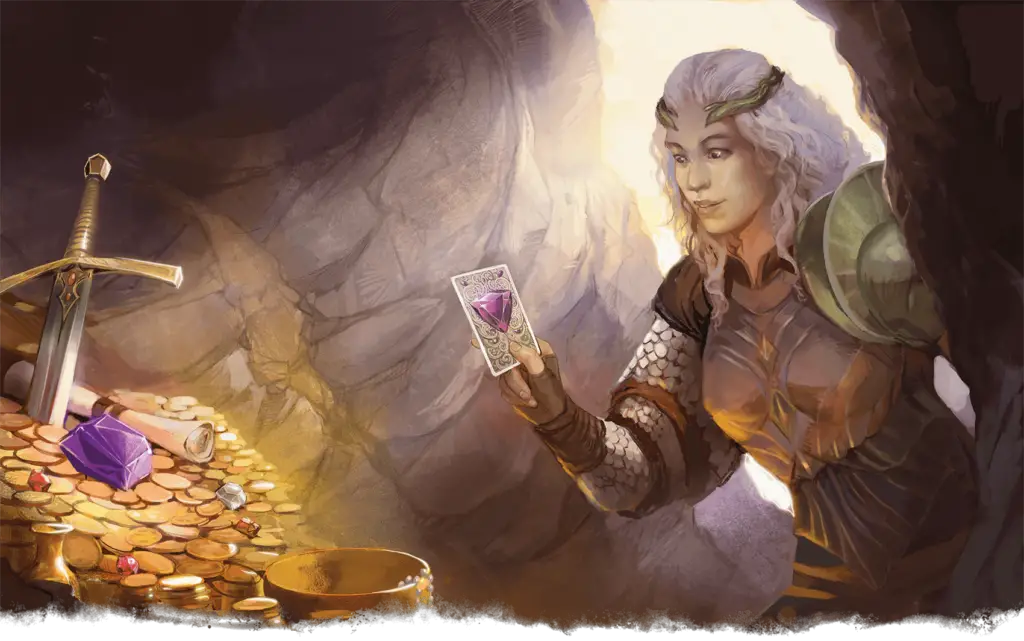
How to Give Your Players Agency in D&D
Once you’ve decided between a sandbox or railroad plot campaign and conducted session zero (or sent a summary email), it’s time to give players agency and freedom as you run the game.
Preparing Content Based on Player Choices
Player-driven plots are exciting for players and easy for you. No, this does not mean you revolve the storylines around their backstories at all times; it means you’re allowing player choices to dictate where you concentrate your DM efforts. For example, if your players fixate on a snooty nobleman who recently taxed them, start preparing more content around that nobleman. The players’ interest will guide you to the gold nuggets.
Your players may be subtle or silent about what aspects of the game they’re latching on to. Asking players for their agendas and details they’ve noted from gameplay will help you discover and anticipate what they want to do.
Most DMs imagine worldbuilding as a private, solitary chore. I’ve found I do my best writing when I have players tinkering around in my world, Daluna. In this way, D&D games function as a brainstorming session for my imagined game setting. I do my best DMing when I allow players to make their choices, and then ruminate on those choices to prepare for future sessions.
I also recommend keeping a list of NPCs and a quirk about them (I keep my list in Excel). This comes in handy when I need a quick NPC for a miscellaneous interaction. I guarantee you some of the most fun your players have will be when they approach a seemingly inconsequential NPC and they end up having a good time roleplaying with them. Pro tip: allow these NPCs to leak a bit of lore or information that will be useful to the players if they’re paying attention.
Balancing Player Agency and Storytelling
I don’t recommend basing all of your preparation on player whims. You should still prepare what you enjoy and are excited about, and supplement that preparation with the signals your players provide. After all, you need a coherent story despite the freedom given to players. Use logic and reasoning to determine cause and effect, but lean on the improv principles of collaboration and positive building (often referred to as the “Yes, and” response.
Balance player desires with your overall campaign goals (which should overlap with your players’ goals). Don’t hesitate to dish out consequences and rewards (I emphasize this because most discussions focus on consequences for player actions). I was shocked by comments on my YouTube video about gold and wealth that described how they never receive rewards like gold from their DMs.
Quick reminder: tell your players before your game starts (or ASAP if your game is ongoing) that you plan to embrace their choices and freedoms for better or worse. I also recommend confirming they’re aware that their characters can die suddenly if their choices and the dice lead to that outcome. This might seem odd to some, but I promise players will enjoy the D&D 5e game more if they believe character death is a fail-state within the game. I recognize some players would rather stop playing than make a new character, so talk to your players and confirm that your expectations align.
How to Quantify Your Player Agency
You can quantify how effectively you’re DMing a game or how much fun you have as a player. Note and count each meaningful action per player per hour in your game. If each player makes at least one meaningful choice per 15-minute interval, your game is cooking, and you can be extremely proud of your game. If the count is less than once per hour, you might have work to do.
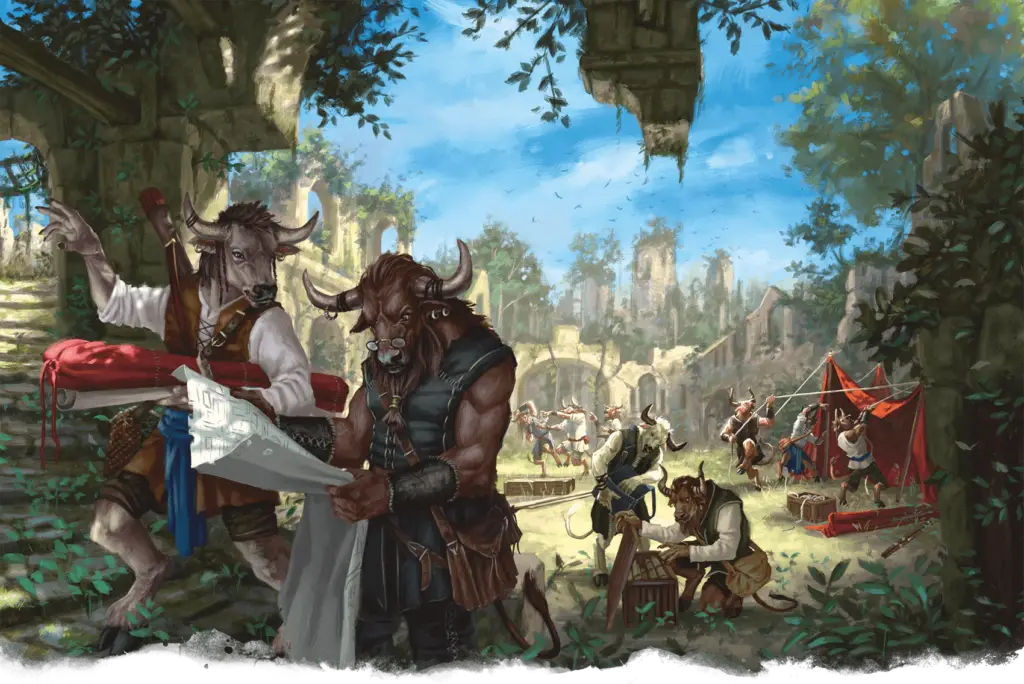
Conclusion
Player agency is the most essential aspect of a D&D campaign. Without freedom of choice, players will become disinterested, the DM will get burned out, and the game will become an ephemeral joke-fest that will leave the whole group wondering why they didn’t continue playing. DMs should avoid illusions of choice like the plague. Nothing has improved the quality and fun of my games than focusing on player agency. I hope you will take my lesson to heart for your own games.
How has player agency affected your games? Cast Message in the comments to tell me all about your experiences. I’m also interested to hear about the modules, tools, and other resources you’ve used that have improved your ability to participate in TTRPGs.
You can find more dungeon master tips and resources right here on FlutesLoot.com.

